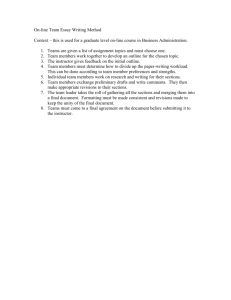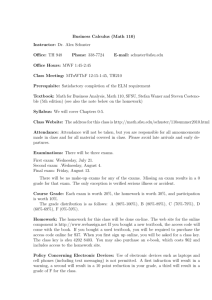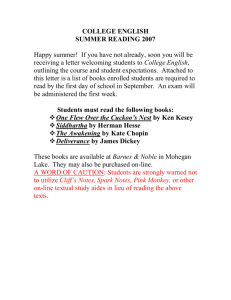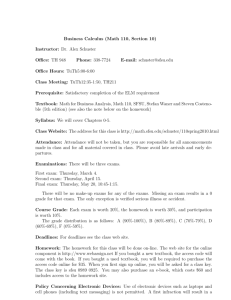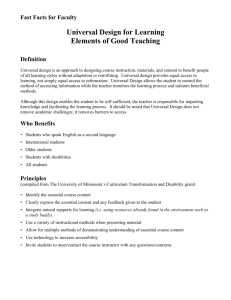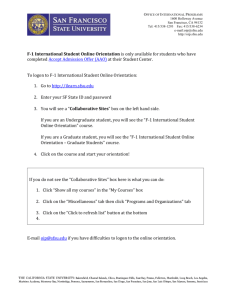Hist. 313 - History Department - San Francisco State University
advertisement
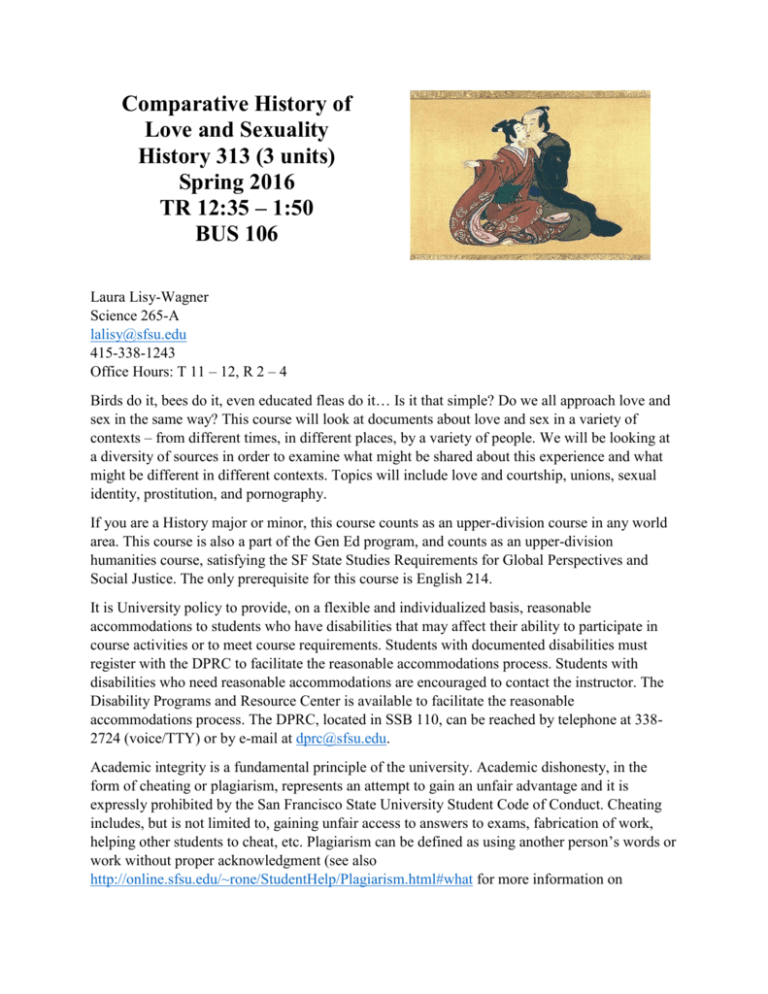
Comparative History of Love and Sexuality History 313 (3 units) Spring 2016 TR 12:35 – 1:50 BUS 106 Laura Lisy-Wagner Science 265-A lalisy@sfsu.edu 415-338-1243 Office Hours: T 11 – 12, R 2 – 4 Birds do it, bees do it, even educated fleas do it… Is it that simple? Do we all approach love and sex in the same way? This course will look at documents about love and sex in a variety of contexts – from different times, in different places, by a variety of people. We will be looking at a diversity of sources in order to examine what might be shared about this experience and what might be different in different contexts. Topics will include love and courtship, unions, sexual identity, prostitution, and pornography. If you are a History major or minor, this course counts as an upper-division course in any world area. This course is also a part of the Gen Ed program, and counts as an upper-division humanities course, satisfying the SF State Studies Requirements for Global Perspectives and Social Justice. The only prerequisite for this course is English 214. It is University policy to provide, on a flexible and individualized basis, reasonable accommodations to students who have disabilities that may affect their ability to participate in course activities or to meet course requirements. Students with documented disabilities must register with the DPRC to facilitate the reasonable accommodations process. Students with disabilities who need reasonable accommodations are encouraged to contact the instructor. The Disability Programs and Resource Center is available to facilitate the reasonable accommodations process. The DPRC, located in SSB 110, can be reached by telephone at 3382724 (voice/TTY) or by e-mail at dprc@sfsu.edu. Academic integrity is a fundamental principle of the university. Academic dishonesty, in the form of cheating or plagiarism, represents an attempt to gain an unfair advantage and it is expressly prohibited by the San Francisco State University Student Code of Conduct. Cheating includes, but is not limited to, gaining unfair access to answers to exams, fabrication of work, helping other students to cheat, etc. Plagiarism can be defined as using another person’s words or work without proper acknowledgment (see also http://online.sfsu.edu/~rone/StudentHelp/Plagiarism.html#what for more information on avoiding plagiarism). Students who are found to have cheated or plagiarized will be subject to discipline ranging from receiving a failing grade for the specific assignment to referral to the Office of Judicial Affairs and Student Discipline to possible suspension or expulsion. All instances of academic dishonesty are reported to the Department Chair and College Dean. Students are responsible for knowing the SFSU regulations concerning cheating and plagiarism, found in the University Bulletin and online at: http://www.sfsu.edu/%7Ehelpdesk/docs/rules/conduct.htm. SF State fosters a campus free of sexual violence including sexual harassment, domestic violence, dating violence, stalking, and/or any form of sex or gender discrimination. If you disclose a personal experience as an SF State student, the course instructor is required to notify the Dean of Students. To disclose any such violence confidentially, contact: The SAFE Place (415) 338-2208; http://www.sfsu.edu/~safe_plc/ Counseling and Psychological Services Center - (415) 338-2208; http://psyservs.sfsu.edu/ For more information on your rights and available resources: http://titleix.sfsu.edu Goals, Objectives, Outcomes – As a part of the university’s mission to pursue education for global perspectives and social justice, participants in this course will strive to: recognize that one’s view of the world is not universally shared and that others may have profoundly different perceptions, analyze similarities and differences among human experiences and perspectives in different parts of the world and draw conclusions about the significance and consequences of these similarities and differences, analyze, articulate, and apply principles of social justice in addressing social constructions of identity, hierarchy, power, and privilege, and identify ways in which they can contribute to social justice within local communities, nations, or the world. Attendance Policy – Attendance is mandatory, and will be considered in your participation grade. Class participation will make up 10% of your final grade for the course. You are encouraged to ask questions at any time and are expected to participate in all class activities, discussions, or exercises. An attendance sheet will be passed around at the beginning of every class. You must sign the sheet in order to be counted as present. If you need to arrive late, please make sure you sign in before you leave the room at the end of class. If you need to leave early, please tell the instructor at the beginning of class. The classroom is a special environment in which students and faculty come together to promote learning and growth. It is essential to this learning environment that respect for the rights of others seeking to learn, respect for the professionalism of the instructor, and the general goals of academic freedom are maintained. Differences of viewpoint or concerns should be expressed in terms which are supportive of the learning process. Readings – There are five required books that will be available at the SFSU bookstore. There are also required readings that will be available on-line, through the ilearn website. Please bring the relevant book(s) to class when we discuss them. On-line readings will be available in .pdf format. These can be read with the Adobe Acrobat reader, which can be downloaded for free. When the readings are on-line, please either print out the on-line excerpt, bring a device on which you can access the document, or take detailed notes on the text. García Márquez, Gabriel, Love in the Time of Cholera, trans. by Edith Grossman, Vintage International edition, ISBN 978-0307389732 Vatsyayana, Kamasutra, trans. by Wendy Doniger and Sudhir Kakar, ISBN 9780199539161 (This is the Oxford World Classics edition – you must use this edition of this text) Packer, Vin, Spring Fire, ISBN 978-1573441872 Foucault, Michel, Herculine Barbin: Being the Recently Discovered Memoirs of a Nineteenth-Century French Hermaphrodite, ISBN 978-0394738628 Chernoff, John, Hustling is not Stealing: Stories of an African Bar Girl, ISBN 9780226103525 Course Requirements – Hist 313 is a reading- and writing-intensive course. In addition to informed and enthusiastic participation in class activities, discussions, and exercises, students in the course will also complete two quick response papers, two short essays, and a group presentation. The written work will be completed at home and handed in at the start of class on the days that they are due. If the assignments are late, they will immediately lose points and will continue to drop in score the longer they are late. The course will also feature a midterm and final exam. The essays will reflect students’ analysis of the larger readings, and the exams will cover all material from class – including smaller texts and work from group activities. The course grade will be determined as follows: Class Participation: 10% Response Papers (1 – 2 pp.): 5% combined First Essay (3 – 5 pp.): 10% Midterm Exam: 15% Second Essay (5 pp.): 20% Group Presentation: 10% Final Exam: 30% If you are a History major and have already completed Hist 300, you may have the option to write a primary source research paper (15 – 20 pp.) in lieu of the two essays. You will choose the topic and create your own thesis. Just as in Hist 300, your argument must be based on primary sources, but you must situate that argument in the secondary literature. If you choose this option, you must have your topic approved by the professor before week 5. You will take both the midterm and the final. If you are a graduate student, you will write a primary source research paper in lieu of the two smaller essays and the midterm. Your paper will be 20+ pages. You will take the final exam, but not the midterm. All graduate students need to check in with the instructor at the beginning of the course. Syllabus – This syllabus and schedule are subject to change at the discretion of the instructor. If you are absent from class, it is your responsibility to check on announcements made while you were absent. When the syllabus says a text is on-line, it can be found on our ilearn website. Log on to our website at ilearn.sfsu.edu by putting in your ID# and password. WEEK 1 – Introductions 1/28: Welcome to 313! WEEK 2 – What is Comparative History? 2/2: Prep for Comparative Exercise – in-class activity 2/4: Presentations for Comparative Exercise RESPONSE PAPER (1 – 2pp.), due in class Tuesday, 2/9: What are the advantages and obstacles of doing a comparative history of love and sexuality? WEEK 3 – What is Love? 2/9: What’s Love Got to Do With It? Lecture and activity: **In-class activity – bring in 8 – 10 lines of a love song to discuss** 2/11: What is Love? Discussions of love stories: Beroul, Romance of Tristan (excerpts on-line – 12th century, northern France) Nizami, Layla and Majnun (excerpts on-line – original story is 7th century, Arabian peninsula, Nizami wrote his version in 12th century Iran) WEEK 4 – Casablanca 2/16: Film: Casablanca (1942) – Director: Michael Curtiz 2/18: Film conclusion and discussion WEEK 5 – Is Love Universal? 2/23: Is Love Universal? Text discussions: Feng Menglong, “The Pearl-Sewn Shirt” (on-line – 17th century China) Kenda Mutongi, “’Dear Dolly’s’ Advice: Representations of Youth, Courtship, and Sexualities in Africa, 1960 – 1980,” from Love in Africa (on-line) 2/25: Writing Discussion How do I write a paper that compares primary sources? How do I cite my sources in footnotes? Look on-line at the Guide to Chicago Manual of Style (on-line) RESPONSE PAPER (1 – 2pp.), due in class Thursday 2/25: Using our readings so far, what is love and is it universal? Please avoid clichés! WEEK 6 – Love in the Time of Cholera Gabriel García Márquez, Love in the Time of Cholera (written in 1985, takes place between 1880 and 1930, Colombia): pp. 3 – 103, 279 – 348 plot summary of middle sections can be found on-line at ilearn site 3/1: Discussion: LITC – pp. 3 – 103 3/3: Discussion: LITC – pp. 279 – 348 ESSAY (3 – 5pp.), due in class Tuesday, 3/8 – Write a clear, well-organized essay with a coherent thesis statement about our readings so far. Questions will be distributed in class 2/25. This assignment must be typed in Times New Roman 12 and double-spaced with sensible margins, and must include footnotes and a bibliography. With the permission of the instructor, you may also write your own question. WEEK 7 – Marriage 3/8: Film: Raise the Red Lantern (1991) – Director: Zhang Yimou 3/10: What Constitutes Marriage? Text discussion: Sarah Pomeroy, Women in Hellenistic Egypt: From Alexander to Cleopatra (online – marriage contracts from 310 BCE to 92 BCE, Egypt) “’It’s Mine’ and ‘It’s Ours’ Are Not the Same Thing: Marrying and Marriage on a Shifting Colonial Terrain,” from I Will Not Eat Stone: A Women’s History of Colonial Asante (on-line – 20th century, Ghana) WEEK 8 – Review Week and Midterm 3/15: In-class Review Session 3/17: MIDTERM EXAM [SPRING BREAK – 3/21 – 3/25 – REST AND ENJOY!] WEEK 9 – How to Do It 3/29: Sex Manuals Vatsyayana Mallanga, Kamasutra (3rd century, India): Book 1: entire, pp. 3 – 27; Book 2: chs. 1 – 2, pp. 28 – 42; ch. 6 “Unusual Sexual Acts”, pp. 55 – 56; chs. 7 – 10, pp. 56 – 74 [NOTE: Do not worry about the footnoted “Yashodhara’s Commentary” – it is very interesting, but we will not be discussing it in class!] 3/31: CESAR CHAVEZ DAY – NO SCHOOL WEEK 10 – Sexual Identities 4/5: A Global Approach to Same-Sex Historiography: Lecture and text discussion: Ihara Saikaku, The Great Mirror of Male Love (selections on-line – 1687, Japan) 4/7: Discussion: Vin Packer (Marijane Meaker), Spring Fire (1952, US) Selections TBA WEEK 11 – Third Sex, Third Gender, and Herculine Barbin Michel Foucault, Herculine Barbin: Being the Recently Discovered Memoirs of a Nineteenth-Century French Hermaphrodite (published in 1980, Barbin lived 1838 – 1868 in France): pp. vii – xvii, 3 – 14, 25 – 33, 41 – 60, 75 – 96, 119 – 151 4/12: Discussion – Herculine Barbin, Introduction and excerpts from “My Memoirs” pp. vii – xvii, 3 – 14, 25 – 33, 41 – 60, 75 – 96 4/14: Discussion – Herculine Barbin, “The Dossier” pp. 119 – 151 WEEK 12 – Discussing Sexuality and Identity 4/19: Primary and Secondary Sources Michel Foucault, The History of Sexuality (short excerpt on-line) Thomas Laqueur, Making Sex (excerpt on-line) 4/21: Using Library Resources and Writing with Primary and Secondary Sources Look at History Research Guide on library website: http://www.library.sfsu.edu/research/guides/guides.php?oSubject=48 WEEK 13 – Hustling is not Stealing John Chernoff, Hustling is not Stealing: Stories of an African Bar Girl (interviews from the late 1970’s, book published 2003, written in US, interviews conducted in Ghana): Chapters 1, 2, 4 - 6 – pp. 121 – 176, 221 – 295 4/26: Discussion: Hustling, chs. 1, 2 4/28: Discussion: Hustling, chs. 4 – 6 ESSAY (5 pp.), due in class Tuesday, 5/3 – Write a clear, well-organized essay with a coherent thesis statement that makes an argument about the readings in the second half of the course while situating the argument in the existing historiography. Questions will be distributed in class 4/21. This assignment must be typed in Times New Roman 12 and double-spaced with sensible margins, and must include footnotes and a bibliography. With the permission of the instructor, you may also write your own question. WEEK 14 – Pornography 5/3: Film: Inside Deep Throat (2005) – Directors: Fenton Bailey and Randy Barbato 5/5: Group Work Session for Class Presentations CLASS PRESENTATIONS, due in class 5/10 – 5/12. Guidelines and assignment will be given in class 5/5, and groups will have class time to organize and prepare. WEEK 15 – Review Week 5/10: Class Presentations 5/12: Class Presentations WEEK 16 – Conclusions 5/17: Review and Wrap-Up FINAL EXAM – Thursday, May 19, 10:45 – 1:15


